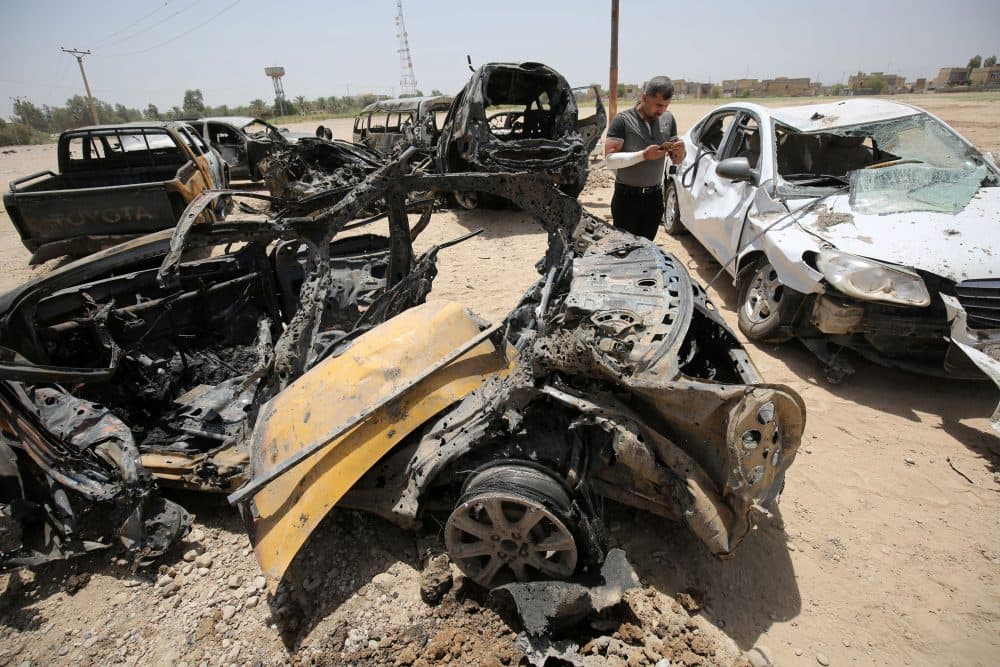Advertisement
Where Did ISIS Really Come From?

After repeatedly claiming that President Obama and Hillary Clinton were the co-founders of ISIS, Republican presidential candidate Donald Trump tweeted this morning that he was just being sarcastic:
But, what is the truth about how ISIS was formed, and what was the motivation for its creation?
Here & Now's Robin Young discusses those questions and more with Ben Watson of Defense One.
Interview Highlights: Ben Watson
On the history of ISIS
"So ISIS as we know it started around 2006, when its predecessor group al-Qaida in Iraq headed by a man named Abu Musab al-Zarqawi was killed and five days later the remaining al-Qaida and ISIS fighters renamed the group 'the Islamic State in Iraq.' It was four years after that when their leader again was killed in a U.S. raid that the current leader of ISIS al-Baghdadi took over."
On the relationship between ISIS and de-Baathification after the invasion of Iraq
"There's a well respected Middle East scholar, Charles Lister of the Middle East Institute, who backs that up with some pretty thorough documentation in his recent book “The Syrian Jihad.” Saddam Hussein, before the invasion, was trying to contain the Sunni unrest in his country by sending some of his officers into mosques and into Sunni territory to kind of foment unrest.
The consequence of that was that a lot of these officers wound up becoming more wrapped up in the broader Sunni struggle against Shia and against non-Sunnis and non-Muslims. Whenever Saddam fell, of course, the military was disbanded and a lot of these people kept up their fight that they had been charged for even before the invasion. Many of them went over and joined Zarqawi’s al-Qaida project."
On where the U.S. is currently fighting wars
"The U.S. is fighting wars, in terms of dropping bombs, in about seven countries. And it began in Afghanistan and Pakistan after the 9/11 attacks when we were pursuing al-Qaida and we were pursuing the Taliban who had harbored al-Qaida and Osama bin Laden. Beyond that it, in less than a year, it went over and shifted over to Yemen, where we took out some al-Qaida fighters there in the first drone strike there in 2002.
And then over to Iraq of course, with the precursors to ISIS on to Somalia and Libya and now Syria — those are the ones that are cited for the 2001 authorization for the use of military force that initially started America's response to the 9/11 attacks. So, seven countries where we're bombing and many more that we have an eye on."
On what the next president could do to contain the conflicts
"It's nice to think that there could be a ‘one thing,’ but it’s a networked, it’s a broad and all encompassing deal that of course the military facet is only one component of, it's only one side of this whole game that involved largely maybe more than anything an inclusive kind of governance model, one that will take the frustrations that led to the uprise of what we now know as ISIS after 2011. It was a lot of sectarianism and a lot of Sunni repression in the country of Iraq.
If you're able to find ways to get representative governments that include these people's complaints and incorporate them into solid action where the complaints do not turn into violence, it really, from what I understand, it's inclusive governance if you’re looking for one particular thing. That's easier said than done. I mean look at, everybody would say, ‘Look at America,’ it took a long time for us to sort of, in so far as we're able to get on our feet. So to expect these folks to come to is kind of fast-food thinking and of course it's not going to happen for many, many years."
Guest
Ben Watson, news editor at Defense One. He tweets @natsecwatson.
This article was originally published on August 12, 2016.
This segment aired on August 12, 2016.